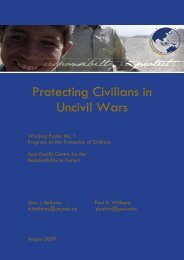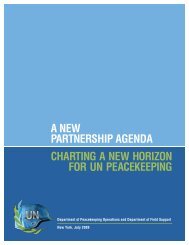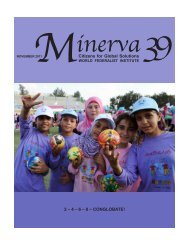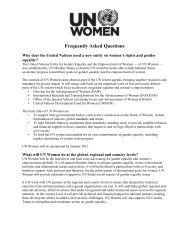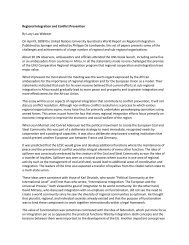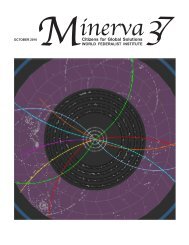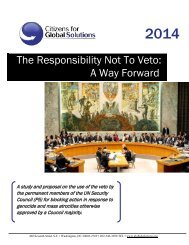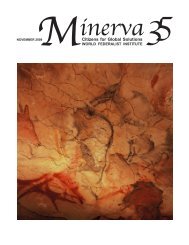Minerva, Spring 2008 (Volume 32) - Citizens for Global Solutions
Minerva, Spring 2008 (Volume 32) - Citizens for Global Solutions
Minerva, Spring 2008 (Volume 32) - Citizens for Global Solutions
Create successful ePaper yourself
Turn your PDF publications into a flip-book with our unique Google optimized e-Paper software.
means of en<strong>for</strong>cement, policymakers, advocates,<br />
and government officials should<br />
consult with members of the UN Security<br />
Council, the Member States of the ICC,<br />
INTERPOL, and regional organizations<br />
that have a security mandate or an obvious<br />
political interest in the conflict.<br />
Challenges Ahead - To function effectively,<br />
international courts such as<br />
the ICC, the International Criminal Tribunals<br />
<strong>for</strong> the Former Yugoslavia and<br />
Rwanda, and the Special Court <strong>for</strong> Sierra<br />
Leone rely primarily upon States’ and<br />
other stakeholders’ readiness to cooperate.<br />
Yet the international community has<br />
witnessed States failing to meet their international<br />
legal obligations to take the<br />
necessary measures to cooperate in the<br />
detection, arrest, and extradition of persons<br />
suspected of crimes that fall within<br />
the jurisdiction of these courts. It is highly<br />
likely there<strong>for</strong>e that the negotiation and<br />
approval of potential substantive and procedural<br />
mechanisms that might influence<br />
States to give effect to their international<br />
obligations will also encounter a number<br />
of challenges in many State capitals.<br />
The international community increasingly<br />
is endorsing the practice of cooperation<br />
through incentive, particularly when the<br />
benefits of entering or complying with<br />
an international agreement have to be<br />
weighed against higher perceived costs.<br />
Depending upon the institutional arrangement<br />
envisioned, States will have to perceive<br />
that the benefits outweigh the costs<br />
and that the option of simply neglecting to<br />
en<strong>for</strong>ce the rule of law is not available. To<br />
accomplish this goal, the chosen mechanism<br />
could create incentives <strong>for</strong> governments<br />
to en<strong>for</strong>ce the rule of law, create<br />
political costs <strong>for</strong> their failure to do so, or<br />
minimize the role of political externalities<br />
in an en<strong>for</strong>cement process. Furthermore,<br />
an en<strong>for</strong>cement mechanism must overcome<br />
governmental inaction caused by a<br />
lack of political will and resolve.<br />
Another challenge <strong>for</strong> the creation of an<br />
en<strong>for</strong>cement mechanism <strong>for</strong> the ICC concerns<br />
the issue of consent. In the territory<br />
of one State, the general rule is that a second<br />
State or entity cannot take en<strong>for</strong>cement<br />
measures, that is, it cannot search<br />
<strong>for</strong> and arrest suspected war criminals,<br />
without the consent of the territorial State.<br />
The exercise of criminal jurisdiction by<br />
one State within the sovereign territory<br />
of another State is a highly controversial<br />
issue in international law. The arrest and<br />
trial of a person suspected of an atrocity<br />
crime who is in a State that fails to either<br />
prosecute or extradite, there<strong>for</strong>e, poses<br />
especially difficult problems because that<br />
State is likely not going to consent to en<strong>for</strong>cement<br />
measures by an international<br />
or regional legal body.<br />
Any international police <strong>for</strong>ce or marshals<br />
service will also have to determine a process<br />
<strong>for</strong> intelligence-sharing with States<br />
involved in the ICC’s investigations. In<br />
many instances during the course of ICC<br />
investigations in Uganda and the DRC,<br />
OTP staff have relied on States’ cooperation<br />
to provide intelligence vital to investigations<br />
that ultimately was not <strong>for</strong>thcoming.<br />
There<strong>for</strong>e an intensified focus on<br />
cooperation <strong>for</strong> an International Marshals<br />
Service in the collection and exchange of<br />
in<strong>for</strong>mation will contribute to the detection,<br />
arrest, extradition, trial and punishment<br />
of persons guilty of war crimes and<br />
crimes against humanity. An en<strong>for</strong>cement<br />
mechanism also will be tasked with providing<br />
assistance in non-permissive environments,<br />
either because the territorial<br />
State does not give consent or the Court’s<br />
investigations will be underway during<br />
complex humanitarian emergencies.<br />
4.2 Schemes <strong>for</strong> ICC En<strong>for</strong>cement<br />
The International Criminal Court’s …<br />
practice already testifies to the limitations<br />
it faces because it lacks a mechanism that<br />
will induce compliance. A variety of compliance<br />
mechanisms were considered during<br />
this conference. Conferees discussed<br />
what the implications would be if the status<br />
quo remained, if the capacity to arrest<br />
w[ere] en<strong>for</strong>ced under UN Security Council<br />
Chapter VII authority; if a regional alliance<br />
or organization like NATO or the<br />
African Union would provide a feasible<br />
solution, or if a purely international marshals<br />
service, functioning in the same capacity<br />
as the US Marshals Service, would<br />
most effectively serve the ICC. Also under<br />
consideration was a permanent or ad hoc<br />
task <strong>for</strong>ce expert on a range of technical,<br />
procedural and legal matters that would<br />
31 • <strong>Minerva</strong> #<strong>32</strong> • June <strong>2008</strong><br />
provide assets necessary to intervene and<br />
deal with situation, permissively or nonpermissively.<br />
Finally, the group identified<br />
and discussed other possible mechanisms<br />
such as reward systems, sealed indictments,<br />
and States that would commit in<br />
advance to an en<strong>for</strong>cement regime. …<br />
V. Next Steps and Conclusion<br />
Several steps, outlined in this report, still<br />
need to be taken to complete the strategy<br />
<strong>for</strong> engaging the American public, its<br />
leadership, and US military personnel on<br />
R2P and the ICC. Specific tasks <strong>for</strong> refining<br />
the strategy include ~<br />
Political Issues on ICC and R2P<br />
• Develop serious research and thoughtful<br />
policy analysis <strong>for</strong> government officials,<br />
academics, civil society, and others concerned<br />
with advancing the issues of R2P<br />
and the ICC, and engage in broad community<br />
dialogue.<br />
• Design an advocacy campaign to build<br />
broad-based American support <strong>for</strong> greater<br />
participation in the international judicial<br />
intervention aspects of R2P, and specifically<br />
in the ICC. The message needs to<br />
illustrate that the new way of thinking<br />
means a new way of protecting.<br />
• Identify the measures needed within the<br />
United States to prevent the commission<br />
of atrocity crimes against civilian populations.<br />
These measures include determining<br />
ratification, implementation, and<br />
compliance with relevant international<br />
legal instruments, including the Rome<br />
Statute.<br />
• Advocate that the USA in some way<br />
must participate in the anticipated 2010<br />
Review Conference of the Rome Statute,<br />
and in particular in the Special Working<br />
Group on the Crime of Aggression.<br />
Addressing Military Concerns<br />
• Develop a gradual engagement program<br />
with US military personnel to ensure that<br />
ICC concepts are understood.<br />
• Focus education strategies initially on<br />
high-level commanders. These strategies




